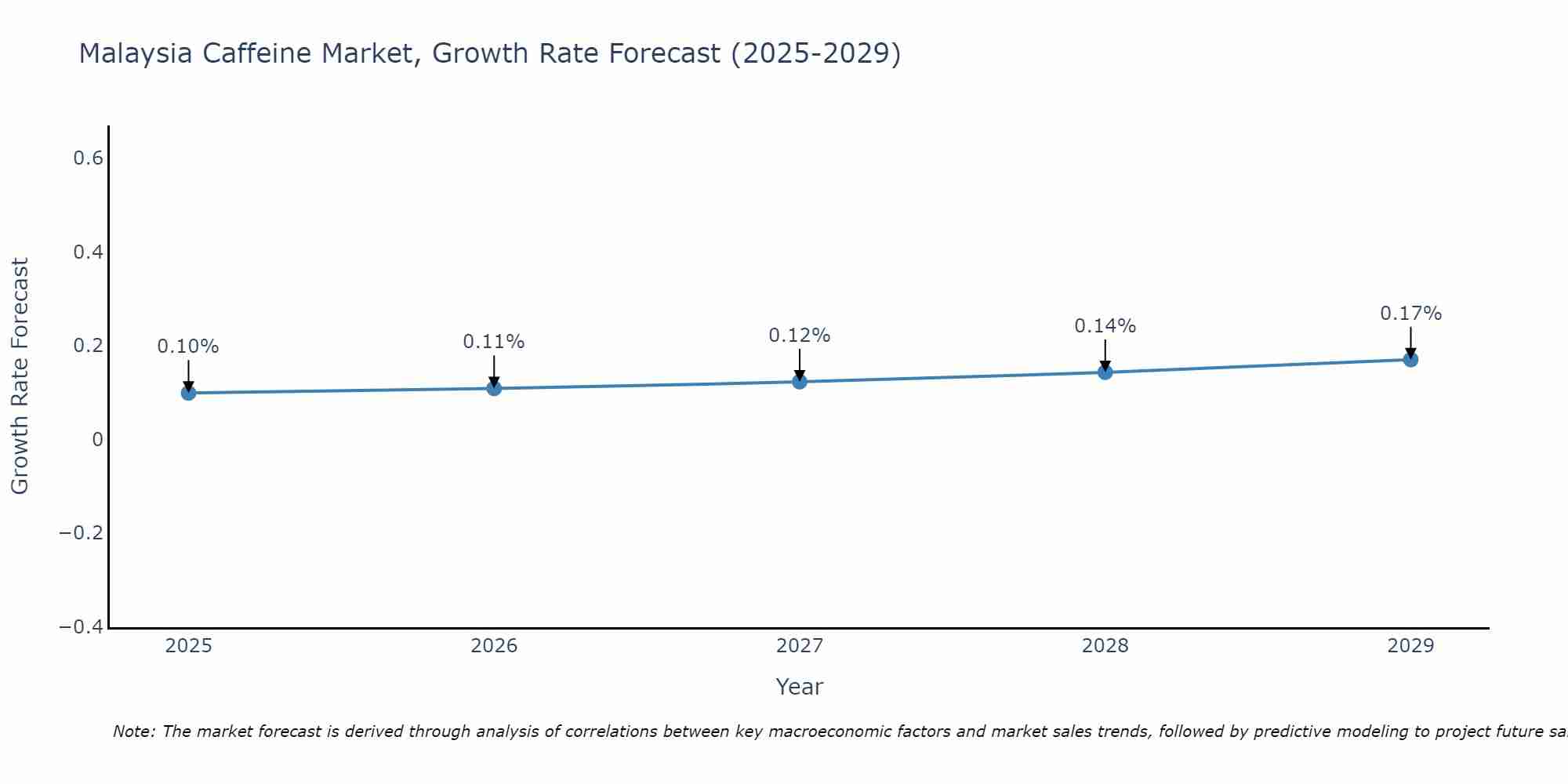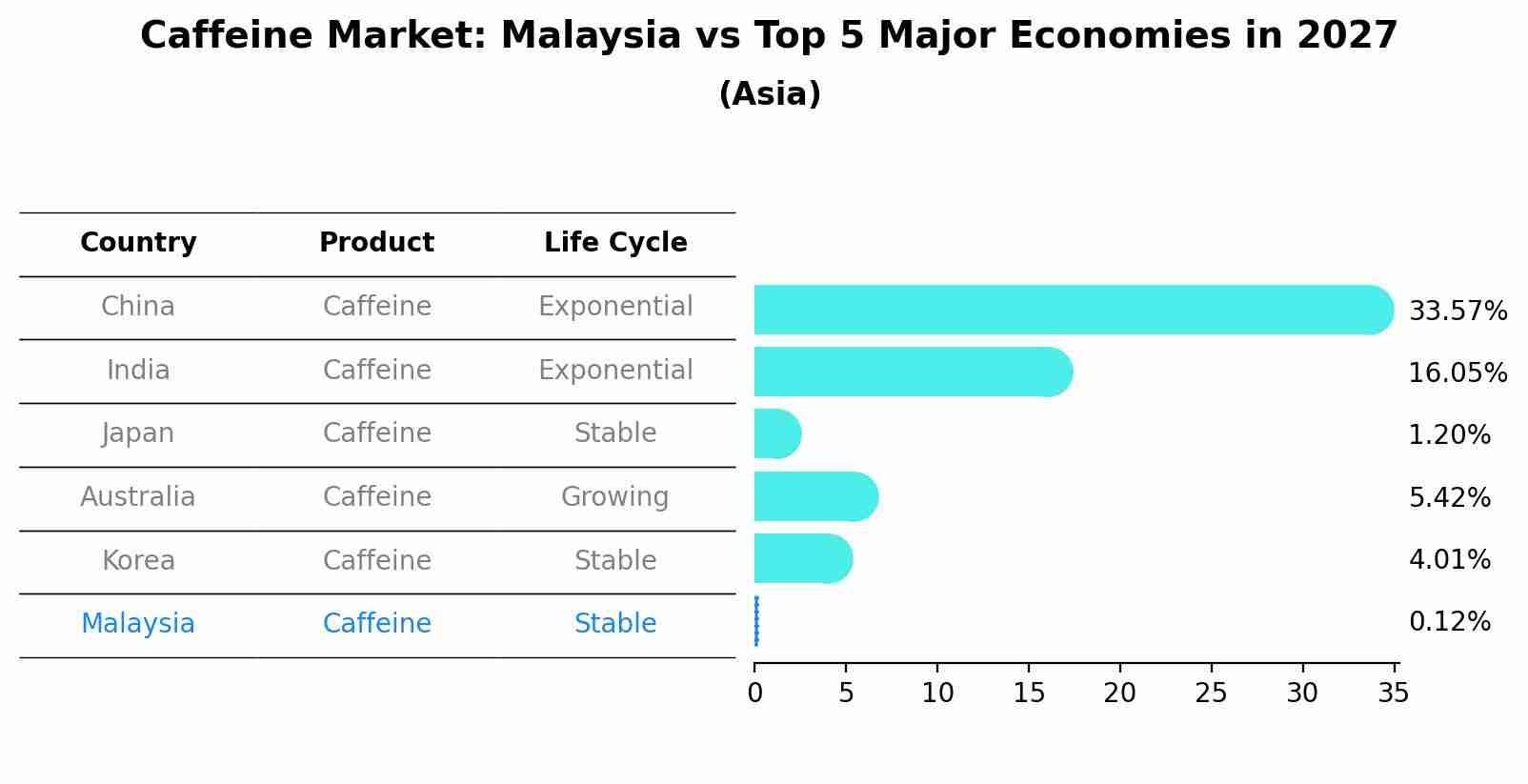Malaysia Caffeine Market (2025-2031) Outlook | Revenue, Companies, Size, Growth, Industry, Trends, Analysis, Share, Forecast & Value
| Product Code: ETC110025 | Publication Date: Jun 2021 | Updated Date: Apr 2025 | Product Type: Report | |
| Publisher: 6Wresearch | Author: Ravi Bhandari | No. of Pages: 70 | No. of Figures: 35 | No. of Tables: 5 |
Malaysia Caffeine Market Size Growth Rate
The Malaysia Caffeine Market is poised for steady growth rate improvements from 2025 to 2029. The growth rate starts at 0.10% in 2025 and reaches 0.17% by 2029.

Caffeine Market: Malaysia vs Top 5 Major Economies in 2027 (Asia)
In the Asia region, the Caffeine market in Malaysia is projected to expand at a stable growth rate of 0.12% by 2027. The largest economy is China, followed by India, Japan, Australia and South Korea.

Malaysia Caffeine Market Synopsis
The Malaysia caffeine market was worth USD 546 million in 2025 and is expected to reach a value of USD 725 million by 2025, registering a CAGR of 4.10% over the forecast period. The demand for caffeine is driven by the increasing consumption of soft drinks, energy drinks, snacks and chocolates among consumers in Malaysia. In addition, rising awareness regarding health benefits associated with moderate caffeine intake has also contributed to market growth. Moreover, growing demand for convenience products and coffee pods are also likely to benefit the overall market growth during the forecast period.
Market Drivers of the market
The Malaysia caffeine market is driven by its widespread use in food, beverages, and pharmaceutical products. Caffeine is a natural stimulant found in coffee, tea, energy drinks, and over-the-counter medications. The market`s growth is fueled by consumer demand for beverages that provide energy and alertness, as well as the use of caffeine in medications and supplements. As lifestyles become more fast-paced and consumers seek products that boost performance and focus, the demand for caffeine-containing products remains strong.
Challenges of the market
The Malaysia caffeine market faces challenges related to consumer perceptions and health considerations. While caffeine is a widely consumed stimulant, concerns about its potential adverse effects and addiction may influence consumer choices. The market must address these concerns by providing transparent information about caffeine content and its effects. Additionally, as the market expands to include caffeine-containing products beyond traditional beverages, market players need to ensure accurate labeling and educate consumers about responsible consumption.
Covid-19 Impact on the market
The Malaysia caffeine market experienced changes in consumer consumption patterns during the pandemic. With restrictions on outdoor activities and increased time spent at home, the demand for caffeinated beverages and products may have fluctuated. Additionally, shifts in consumer priorities towards health and wellness could impact consumption trends. The market`s recovery depends on adapting product offerings to changing lifestyles and effectively communicating the benefits of caffeine-containing products to consumers.
Key Players of the market
The Malaysia caffeine market is driven by its applications in beverages, pharmaceuticals, and energy products. Key players in this market, including CaffeineTech Solutions, BeverageCaffeine Innovations, and PharmaCaffeine Co., contribute to the supply of caffeine. These companies prioritize sourcing, purification, and formulation support to meet the needs of different industries.
Key Highlights of the Report:
- Malaysia Caffeine Market Outlook
- Market Size of Malaysia Caffeine Market, 2024
- Forecast of Malaysia Caffeine Market, 2031
- Historical Data and Forecast of Malaysia Caffeine Revenues & Volume for the Period 2021-2031
- Malaysia Caffeine Market Trend Evolution
- Malaysia Caffeine Market Drivers and Challenges
- Malaysia Caffeine Price Trends
- Malaysia Caffeine Porter's Five Forces
- Malaysia Caffeine Industry Life Cycle
- Historical Data and Forecast of Malaysia Caffeine Market Revenues & Volume By Type for the Period 2021-2031
- Historical Data and Forecast of Malaysia Caffeine Market Revenues & Volume By Natural Caffeine for the Period 2021-2031
- Historical Data and Forecast of Malaysia Caffeine Market Revenues & Volume By Synthetic Caffeine for the Period 2021-2031
- Historical Data and Forecast of Malaysia Caffeine Market Revenues & Volume By Applications for the Period 2021-2031
- Historical Data and Forecast of Malaysia Caffeine Market Revenues & Volume By Pharmaceuticals for the Period 2021-2031
- Historical Data and Forecast of Malaysia Caffeine Market Revenues & Volume By Food for the Period 2021-2031
- Historical Data and Forecast of Malaysia Caffeine Market Revenues & Volume By Beverages for the Period 2021-2031
- Historical Data and Forecast of Malaysia Caffeine Market Revenues & Volume By Flavours and Fragrances for the Period 2021-2031
- Malaysia Caffeine Import Export Trade Statistics
- Market Opportunity Assessment By Type
- Market Opportunity Assessment By Applications
- Malaysia Caffeine Top Companies Market Share
- Malaysia Caffeine Competitive Benchmarking By Technical and Operational Parameters
- Malaysia Caffeine Company Profiles
- Malaysia Caffeine Key Strategic Recommendations
Frequently Asked Questions About the Market Study (FAQs):
Export potential assessment - trade Analytics for 2030
Export potential enables firms to identify high-growth global markets with greater confidence by combining advanced trade intelligence with a structured quantitative methodology. The framework analyzes emerging demand trends and country-level import patterns while integrating macroeconomic and trade datasets such as GDP and population forecasts, bilateral import–export flows, tariff structures, elasticity differentials between developed and developing economies, geographic distance, and import demand projections. Using weighted trade values from 2020–2024 as the base period to project country-to-country export potential for 2030, these inputs are operationalized through calculated drivers such as gravity model parameters, tariff impact factors, and projected GDP per-capita growth. Through an analysis of hidden potentials, demand hotspots, and market conditions that are most favorable to success, this method enables firms to focus on target countries, maximize returns, and global expansion with data, backed by accuracy.
By factoring in the projected importer demand gap that is currently unmet and could be potential opportunity, it identifies the potential for the Exporter (Country) among 190 countries, against the general trade analysis, which identifies the biggest importer or exporter.
To discover high-growth global markets and optimize your business strategy:
Click Here- Single User License$ 1,995
- Department License$ 2,400
- Site License$ 3,120
- Global License$ 3,795
Search
Thought Leadership and Analyst Meet
Our Clients
Related Reports
- India Switchgear Market Outlook (2026 - 2032) | Size, Share, Trends, Growth, Revenue, Forecast, Analysis, Value, Outlook
- Pakistan Contraceptive Implants Market (2025-2031) | Demand, Growth, Size, Share, Industry, Pricing Analysis, Competitive, Strategic Insights, Strategy, Consumer Insights, Analysis, Investment Trends, Opportunities, Revenue, Segments, Value, Segmentation, Supply, Forecast, Restraints, Outlook, Competition, Drivers, Trends, Companies, Challenges
- Sri Lanka Packaging Market (2026-2032) | Outlook, Competition, Drivers, Trends, Demand, Pricing Analysis, Competitive, Strategic Insights, Companies, Challenges, Strategy, Consumer Insights, Analysis, Investment Trends, Opportunities, Growth, Size, Share, Industry, Revenue, Segments, Value, Segmentation, Supply, Forecast, Restraints
- India Kids Watches Market (2026-2032) | Strategy, Consumer Insights, Analysis, Investment Trends, Opportunities, Growth, Size, Share, Industry, Revenue, Segments, Value, Segmentation, Supply, Forecast, Restraints, Outlook, Competition, Drivers, Trends, Demand, Pricing Analysis, Competitive, Strategic Insights, Companies, Challenges
- Saudi Arabia Core Assurance Service Market (2025-2031) | Strategy, Consumer Insights, Analysis, Investment Trends, Opportunities, Growth, Size, Share, Industry, Revenue, Segments, Value, Segmentation, Supply, Forecast, Restraints, Outlook, Competition, Drivers, Trends, Demand, Pricing Analysis, Competitive, Strategic Insights, Companies, Challenges
- Romania Uninterruptible Power Supply (UPS) Market (2026-2032) | Industry, Analysis, Revenue, Size, Forecast, Outlook, Value, Trends, Share, Growth & Companies
- Saudi Arabia Car Window Tinting Film, Paint Protection Film (PPF), and Ceramic Coating Market (2025-2031) | Strategy, Consumer Insights, Analysis, Investment Trends, Opportunities, Growth, Size, Share, Industry, Revenue, Segments, Value, Segmentation, Supply, Forecast, Restraints, Outlook, Competition, Drivers, Trends, Demand, Pricing Analysis, Competitive, Strategic Insights, Companies, Challenges
- South Africa Stationery Market (2025-2031) | Share, Size, Industry, Value, Growth, Revenue, Analysis, Trends, Segmentation & Outlook
- Afghanistan Rocking Chairs And Adirondack Chairs Market (2026-2032) | Size & Revenue, Competitive Landscape, Share, Segmentation, Industry, Value, Outlook, Analysis, Trends, Growth, Forecast, Companies
- Afghanistan Apparel Market (2026-2032) | Growth, Outlook, Industry, Segmentation, Forecast, Size, Companies, Trends, Value, Share, Analysis & Revenue
Industry Events and Analyst Meet
Whitepaper
- Middle East & Africa Commercial Security Market Click here to view more.
- Middle East & Africa Fire Safety Systems & Equipment Market Click here to view more.
- GCC Drone Market Click here to view more.
- Middle East Lighting Fixture Market Click here to view more.
- GCC Physical & Perimeter Security Market Click here to view more.
6WResearch In News
- Doha a strategic location for EV manufacturing hub: IPA Qatar
- Demand for luxury TVs surging in the GCC, says Samsung
- Empowering Growth: The Thriving Journey of Bangladesh’s Cable Industry
- Demand for luxury TVs surging in the GCC, says Samsung
- Video call with a traditional healer? Once unthinkable, it’s now common in South Africa
- Intelligent Buildings To Smooth GCC’s Path To Net Zero


















